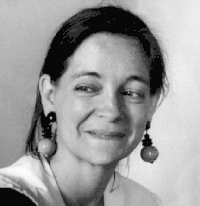Maria Mercè Marçal
Maria Mercè Marçal i Serra (November 13, 1952 – July 5, 1998) was a Catalan poet, professor, writer and translator from Spain.
Maria Mercè Marçal | |
|---|---|
 | |
| Born | November 13, 1952 Ivars d'Urgell, Spain |
| Died | July 5, 1998 (aged 45) Barcelona, Spain |
| Occupation | Poet, Professor, Writer, Translator |
| Language | Catalan |
| Nationality | Spanish |
| Alma mater | University of Barcelona |
| Notable awards | Prudenci Bertrana Prize 1995 La passió segons Renée Vivien |
| Spouse | Ramon Pinyol Balasch (1972-1976) |
Biography
Marçal was born in Barcelona[1] but spent her childhood in Ivars d'Urgell (Pla d'Urgell), which she considered her home. Her mother was Maria Serra, a woman who loved theater and songs, and her father was Antoni Marçal, who had to leave college for family reasons. She had a sister Magda.[2]
She went to high-school in Lleida, at the Institut de Lleida, after receiving a scholarship. She then studied literature at the University of Barcelona, earning a degree in Classical Philology there. She went on to become a Professor of Catalan Language and Literature.[1]
In 1972, Marçal married the poet Ramon Pinyol Balasch. They separated some time afterward.[2]
In 1973, she was co-founder of the publishing house Llibres del Mall with her husband and another young Catalan poet, Xavier Bru de Sala.[1][3]
In 1980, her daughter Heura was born, an experience that she transformed into tender poetry.[3]
In 1992 she proposed the creation of Catalan Women Writers as part of the Catalan Centre for PEN.[3]
She translated into Catalan works by both French and Russian writers: Colette, Marguerite Yourcenar, Anna Akhmatova, Marina Tsvetaeva, Baudelaire and Leonor Fini.[1][3]
Legacy
Marina Rossell, Teresa Rebull, Ramon Muntaner, Txiqui Berraondo, Maria del Mar Bonet, Celdoni Fonoll and Gisela Bellsolà have sung Marçal's poems.[1][2]
Works
In 1976, Marçal's first book of poems Cau de llunes (winning the Carles Riba Prize),[2] introduced by a splendid poetic sestina penned by Joan Brossa, includes the poem "Divisa," which is like a manifesto summarizing what guided her activism:
To fate I am grateful for three gifts: having been born a woman,
of low class and oppressed nation.
And the turbid azure of being three times a rebel.
Selected Publications[3]
- Cau de llunes. Barcelona: Proa, 1977. ISBN 84-209-7191-X
- Bruixa de dol (1977–1979). Sant Boi de Llobregat: Llibres del Mall, 1979. ISBN 84-7456-049-7
- Terra de mai. Valencia: El cingle, 1982. ISBN 84-7456-124-8
- Sal oberta. Sant Boi de Llobregat: Llibres del Mall, 1982. ISBN 84-7456-122-1
- La germana, l'estrangera (1981–1984). Sant Boi de Llobregat: Llibres del Mall, 1985. ISBN 84-7456-277-5
- Contraclaror: antologia poètica, de Clementina Arderiu. Barcelona: La Sal, edicions de les dones, 1985. ISBN 84-85627-26-1
- Desglaç (1984–1988). Barcelona: Edicions 62 - Empúries, 1988.
- Llengua abolida (1973–1988). Valencia: Climent, 1989. ISBN 84-7502-246-4
- La passió segons Renée Vivien. Barcelona: Proa, 1994. ISBN 84-7809-739-2
- Paisatge emergent: trenta poetes catalanes del S.XX. Barcelona: La Magrana, 1999. ISBN 84-8264-167-0
- Raó del cos. Barcelona: Edicions 62 - Empúries, 2000. ISBN 84-297-4685-4
- Contraban de llum: antologia poètica. Barcelona: Proa, 2001. ISBN 84-8256-672-5
- El meu amor sense casa (CD). Barcelona: Proa, 2003. ISBN 84-8437-513-7
References
- "English Maria-Mercè Marçal | Associació d'Escriptors en Llengua Catalana". www.escriptors.cat. Retrieved 2020-03-13.
- "Fundació Maria-Mercè Marçal | Biografia" (in Spanish). Retrieved 2020-03-13.
- "Maria-Mercé Marçal". The Institute of Modern Languages Research. 2017-03-17. Retrieved 2020-03-13.